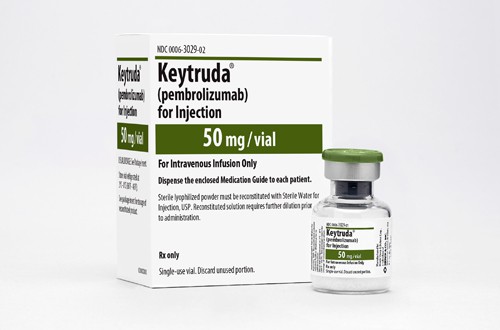
Using chemotherapy to treat non-small cell lung cancer (NSCLC) could in time be relegated to second-place, now that a trial of Merck & Co’s immunotherapy Keytruda has shown an improvement in overall survival.
The results of the KEYNOTE-042 trial, reported at ASCO over the weekend, showed that giving Keytruda (pembrolizumab) to previously-untreated NSCLC patients improved survival by four to eight months compared to standard platinum-based chemo, and as might be expected significantly reduced the side effect burden.
Crucially, the trial enrolled patients with PD-L1 expression levels of 1% or more, a much broader patient population than was tested in the earlier KEYNOTE-024 trial of Keytruda monotherapy in first-line NSCLC, which resulted in the drug’s approval as a treatment option in patients with expression levels of the biomarker above 50%.
At the moment Keytruda is still the only cancer immunotherapy approved for the initial treatment of NSCLC and has also been cleared for use in combination with chemo. The new data consolidate its dominant position, although other companies are trying to muscle in on its territory.
That includes Roche, which reported updated data from the IMpower131 study at ASCO showing a significant 29% improvement in the risk of disease worsening or death for its PD-L1 inhibitor Tecentriq (atezolizumab) plus chemo versus chemo alone in previously-untreated squamous NSCLC patients. However, at the time of the presentation it wasn’t able to detect any improvement in overall survival and Roche is continuing the study in the hope of demonstrating that at a later date.
Merck has new data for Keytruda in combination with chemo in first-line NSCLC, however, and seems to be keeping its nose in front of the competition in that setting too.
The KEYNOTE-407 trial reported yesterday showed that Keytruda plus chemo reduced the risk of death by 36% compared to chemo on its own in patients with advanced squamous NSCLC, and reduced PFS by 44%, seemingly doing better than Tecentriq on that score although the trials are clearly not comparable.
Meanwhile, Bristol-Myers Squibb has been playing catch-up since a trial of its PD1 inhibitor Opdivo (nivolumab) failed to show efficacy in NSCLC patients with a range of PD-L1 expression levels two years ago.
It too is trying to break into front-line treatment with CheckMate-227, which is comparing Opdivo plus platinum chemo to chemo alone in patients with PD-L1 expression levels above 1% and will present those results at ASCO later today. The abstract for the study shows that the drug improved progression-free survival (PFS).
As it stands, Merck’s lead in the big NSCLC market only looks likely to be maintained in the wake of the ASCO presentations, with the chemotherapy combination likely to remain first-choice for many patients and monotherapy an option for those who can’t or don’t wish to go down the chemotherapy route.




